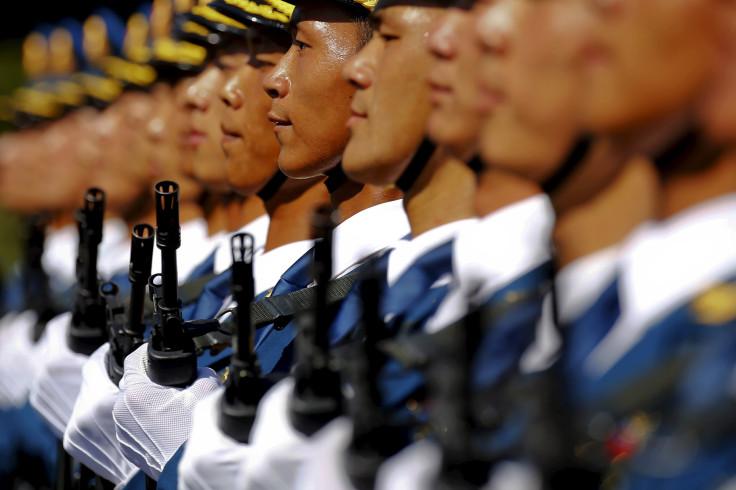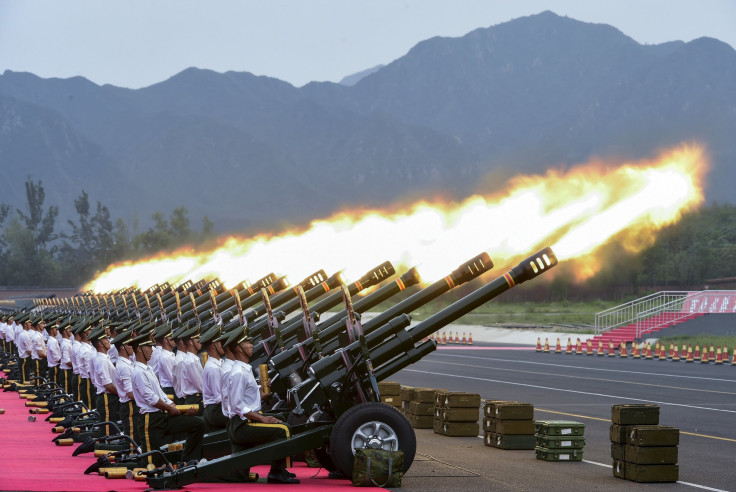China Military Parade: Restrictions On Industry, Infrastructure Are Cost Of Symbolically Important Event For Government

As China prepares for its biggest military parade in years, to mark 70 years since the defeat of Japanese forces during World War II, the Communist Party government is implementing wide-ranging restrictions on businesses, transportation and even removing frivolous content from television schedules.
The parade, to be held Sept. 3, marks what China officially refers to as Victory of the Chinese People’s Resistance Against Japanese Aggression and World Anti-Fascist War. The parade will feature 12,000 soldiers and about 500 pieces of military equipment, including tanks, missiles and artillery.
With China's economy slowing, and the government's reaction to the volatility on its stock markets under scrutiny, the event, the first of its kind under President Xi Jinping, represents a chance for a Chinese leadership concerned about its legitimacy to shore up public support with an appeal to patriotism.
“In such a large scale public event, the Chinese leaders want to display Chinese power politically, and then the organizers become highly nervous,” Qin Qianhong, a law professor at Wuhan University, based in Hubei province, told Bloomberg.
The restrictions being imposed in the capital, Beijing, include measures designed to curb the city's notorious air pollution. Private cars will only be allowed to drive every other day between Aug. 20 to Sept. 3, and 80 percent of public vehicles in the city will be suspended from use. The city's main airport will also suspend flights for 3 hours on the day of the parade.
In addition, authorities have ordered over 12,000 factories in the city and its environs to suspend operations. Almost 4,000 companies in the surrounding Hebei province have also been ordered to cease operating. Such restrictions are common when Beijing hosts high-profile events -- when the city hosted the 2014 APEC Summit, Beijingers dubbed the new color of the sky brought about by pollution restrictions 'APEC Blue'.

The restrictions on industry will come at a cost to many businesses in the Beijing area.
“All the staff have days off now and I get no compensation at all from the government, but still have to pay the workers as usual,” Ren Ningning, the owner of a concrete factory on the outskirts of the city, which has been shut since the middle of August, told the Wall Street Journal. “I have to bear the loss myself.”
Other workers told the paper that they were not being paid for their time off, and would suffer financial loss themselves as a result of the restrictions.
In addition to restrictions on pollution, some public amenities like parks will be temporarily closed, as will major tourist attractions in the Tiananmen Square area. Authorities have also instructed that some entertainment programs be removed from TV schedules, and have placed restrictions on some e-commerce.
Some Chinese Internet users complained about the inconvenience caused by the restrictions. Users posting on Weibo, China's version of Twitter, branded the parade and an August dress rehearsal that saw similar restrictions as a "harassment to ordinary people and a waste of money," according to the South China Morning Post.
Despite the restrictions, experts underscored the importance to China's leadership of an event of this kind.
"[Chinese president] Xi Jinping just can't afford to appear that he is not fully in control, fully in charge, and confident," Steve Tsang, a senior fellow in the China Policy Institute at the University of Nottingham, told the Los Angeles Times. "The inconvenience to the citizens of Beijing is not a major factor" for the authorities, he added.
© Copyright IBTimes 2024. All rights reserved.






















